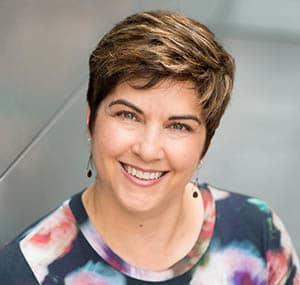"A challenged world is an alert world and from challenge comes change."
In honor of Women's History Month, Kristi Brown-Montesano, Ph.D. joins LA Opera as a guest contributor.
___________________________________________________________
The theme for International Women’s Day 2021 is “Choose to Challenge,” a reminder to everyone to “challenge inequality, call out bias, question stereotypes, and help forge an inclusive world.”
Many opera companies and artists have already begun the difficult but necessary work of reassessing the status quo, pushing for diversity and positive representation in the repertoire as well as in creative personnel and leadership. But even today, women are woefully underrepresented in key roles, including composers, stage directors, conductors, artistic directors, and general directors.
Consider the nine opera companies in OPERA America’s “budget 1” tier: Dallas, Houston, Los Angeles, Chicago, Michigan, Philadelphia, San Francisco, Santa Fe, and Seattle. (With an annual budget of over $300,000,000, the Metropolitan Opera occupies its own category.) Among these companies, only Seattle has a female general manager, Christina Scheppelmann, appointed in 2019. The only female music director among these companies, Eun Sun Kim, officially starts her tenure in San Francisco this year.
Onstage, of course, there are plenty of female-identifying vocalists and dancers, but the statistics for composers, conductors, and stage directors are pretty disheartening. During the 2018/19 season—the last full season before Covid-19 closed houses—the nine “budget 1” companies staged 63 works. Only two of these operas were by women: Ellen Reid’s Pulitzer-winning "prism" (premiering at LA Opera and co-produced by Beth Morrison Productions) and Rene Orth’s Empty the House (Opera Philadelphia). The numbers are only a little better for conductors; women led the music of seven productions (11%). Stage direction is more encouraging, with women directing 17 productions (27%).
Historically, the culture of Western classical music has traded heavily in traditional ideas of (white) male genius, and—as the above statistics show—this patriarchal legacy still resonates strongly in today’s opera world. And, yet, there are also hundreds of women pushing back these old-school systems, bringing fierce creative energy and new vision to the world of opera. We wanted to spotlight at least a few of these amazing women who are “choosing to challenge” the world of opera and beyond.
Broadening the Narrative: Naomi André, opera scholar

Naomi André, opera scholar
In her book Black Opera: History, Power, Engagement (2018), musicologist Naomi André recounts two illuminating experiences with Verdi’s Otello: taking a visiting Black scholar from South Africa to the 2012 Met Live in HD broadcast, starring Afrikaner tenor Johan Botha in blackface and then seeing the opera again in 2015 (the year that the Met stopped using blackface in its productions) with another white singer, Latvian tenor Alexandrs Antonenko singing the title role. Considering the significance of this shift, André notes that “the opera stage is the only stage in the world today where this practice of using blackface makeup for non-Black singers to portray Black roles is a regular feature that is practiced, accepted, and—until very recently—never discussed.” Yet she also sees opera as “a flexible and capacious genre,” that offers a compelling space for “expanding the current narrative of history, by including the legacies of slavery, colonialism, Jim Crow, or apartheid.”
André’s love of music and opera began early: listening to her mother—a Juilliard-trained coloratura soprano—singing at church and events and playing her great-grandmother’s piano. A singer herself, André studied music at Barnard College, taking advantage of cheap standing-room tickets at the Met. She pursued graduate studies in musicology at Harvard, becoming the first Black woman to attain a Ph.D. from the department of music. Now a professor at the University of Michigan, she teaches in Women’s Studies, Afroamerican and African Studies, and the Arts and Ideas in the Humanities program.
Today her highly respected work is resonating beyond academic circles, directly influencing opera culture and production. After serving on panels for Seattle Opera’s recent productions of Porgy and Bess and Carmen, André became the company’s inaugural Scholar in Residence, advising staff, leadership, and artistic planning on matters of race and gender in opera. André welcomes this new self-awareness as essential to the genre’s future: “A key to the genre’s success is to help current audiences see that opera is relevant to our lives today. Putting care into productions and educational materials that reflect the broader issues goes a long way to help audiences today.”
Directing as Activism: Robin Guarino, stage director

Robin Guarino, stage director
Stage director Robin Guarino has proven naysayers wrong many times during distinguished career: “I was told you can’t raise kids if you want to work and have a career. My partner and I have a child who is now 17. I was told that, listen, if you work at a big house like the Met, you’ll never have an independent career. Well, I have an independent career and I worked at the Met. And oh, don’t teach because those that teach cannot do—and that’s crazy. I love teaching. I love being a teaching artist. It is totally fulfilling, deep, and challenging.”
Born into a family with connections to both theater and the Metropolitan Opera, Guarino knew that she wanted to be a stage director even before she started high school. She began as a stagehand at the Met—the first female stagehand in the company’s history—learning, as she explains in an interview with the Cincinnati Opera “the art of the stage, from the backstage forward.”
Inspired by vanguard women in the field such as Rhoda Levine and Francesca Zambello, Guarino had her first professional break as a director staging a performance of Ricky Ian Gordon's Autumn Valentine with texts by Dorothy Parker. Later she had opportunities to work closely with two very different luminaries—Jean-Pierre Ponnelle and Robert Wilson—as she crafted her own directorial voice and vision. In a career now stretching three decades, Guarino has directed numerous canonic works at companies around the world, but she brings a particular passion to new works, having staged six world premieres to date.
In 2008, Guarino found a perfect home for her pedagogical and creative experience at the University of Cincinnati-Conservatory of Music (CCM), where Guarino holds the J. Ralph Corbett Distinguished Chair in Opera. Since 2011, she has also been co-artistic director of Opera Fusion: New Works, an exciting partnership between Cincinnati Opera and CCM that fosters the development of new American opera. LA Opera fans will recognize at least one name on the list of new operas first workshopped at Opera Fusion: New Works—Matthew Aucoin’s Eurydice, which premiered at LAO during the 2019/20 season. Guarino believes the work that she and her collaborators are doing has crucial stakes: “We wanted to create a vital repertoire that meant something to our audience and to young people and to future opera audiences, and that meant it had to be vital to their life experience. And often that means dealing with difficult thematics or social justice themes.”
Owning the Podium: Eun Sun Kim, music director

Eun Sun Kim, conductor (Photo: Cory Weaver)
Shortly after completing her doctorate in orchestral conducting from the Stuttgart State University of Music, Eun Sun Kim won the López-Cobos International Opera Conductors Competition and—as part of the prize— served for two years (2008–10) as assistant conductor to Jesús López-Cobos at the Teatro Real in Madrid. Professional momentum followed, as Kim built strong relationships as a guest conductor with opera companies throughout Europe and North America. In 2018, Kim became the Houston Grand Opera’s first principal guest conductor in 25 years; the next year, San Francisco Opera named her as its next music director with an official start in August 2021. She will be the first Asian and first woman to hold the music director post at an American opera company of this stature. Just a few months after the historic announcement, she made her LA Opera debut conducting the company's production of Roberto Devereux.
In a recent live-stream interview with Sheri Greenawald (former director of the San Francisco Opera Center), Kim responds with humor and reasoned optimism to questions about being a “woman conductor.” She recalls what her agent said to her 11 years earlier: “Let’s be realistic. You are a woman, you are an Asian, you are small, you are young. So just in order to be at the start line with everybody else you have to be like four times better than anyone. And then nobody can guarantee that you would start your career by then even though you would be at the start line with the others.” Kim acknowledges that her agent was just telling it to her straight, “giving me a realistic situation, what we're living.”
As an example of historical change, Kim shares the example of her grandmother, who was born in 1912 and became a medical doctor at a time when very few women gained access to that profession. Kim explains that when her grandmother first started practicing, everyone called her the “female doctor,” but that she lived long enough to see a time when women were just called “doctor,” because there were so many of them in the field. Kim hopes that the same will be possible for women who go into conducting. She recalls, laughing, the time she went to the restroom during a rehearsal break in San Francisco; one of the female musicians saw her and remarked that she never expected in her lifetime to see a conductor in the women’s bathroom. “Well, here I am!” Kim announces, laughing. Here she is, indeed, and it’s a proud moment for opera as well as for Kim.
Sponsoring Change: Sue Marineau and the Marineau Family Foundation

Sue Marineau, philanthropist and president of the Marineau Family Foundation
In February 2021, OPERA America announced the launch of its Opera Grants for Female Stage Directors and Conductors—a concrete initiative “to advance gender parity in the field by incentivizing opera companies to hire women for key leadership roles.” The actual funding will come from the Marineau Family Foundation, under the leadership of its president, Sue Marineau, a longtime supporter of women’s causes and opera. Her commitment to the well-being and advancement of women goes back decades; she was founding president of Between Friends, a non-profit resource for victims of domestic violence serving the Chicago area, and later served as vice-chair of the Women’s Foundation of California. Listed among the Marineau Family Foundation’s chief values is the belief that “women and children, especially girls, are at the heart of positive social change.”
In addition to heading the family philanthropic organization, Marineau serves as president of the board of the Santa Fe Opera and on the board of directors of OPERA America. Speaking about the new grant for female-identifying conductors and stage directors, Marineau expressed hope “that these grants will not only encourage companies to consider the many talented women who can lead their productions, but also promote gender parity within an organization from the top down.” She also views the short-term grants as an investment in the long game: “When a company hires a female director or conductor, that sends a powerful message to women aspiring to such roles and often leads to more equitable hiring practices among all artistic personnel.”
The Opera Grants for Female Stage Directors and Conductors is just the latest initiative that OPERA America has launched during the past seven years in order to “increase gender parity throughout the field.” In 2014, this national association (with over 500 organizational members and nearly 2,000 individual members) awarded its first Opera Grant for Female Composers; the next year it launched the Women’s Opera Network, an “action group of opera stakeholders from all sectors of the field dedicated to advancing gender equity in the industry.” In 2018, OPERA America addressed the egregious lack of women leaders in the field, creating the Mentorship Program for Women Administrators, pairing applicants with opera leaders who support and nurture their career goals.
Representing, Onstage and Off: Ailyn Pérez, soprano

Ailyn Pérez, soprano
In 2012, Ailyn Pérez was flagged by Opera News as a vocalist on the rise; seven years later she was honored with one their Awards for Distinguished Achievement. In the intervening years, Pérez appeared in houses all over the world, including a debut and leading roles in three productions with the Metropolitan Opera during the 2017/18 season. Discussing her journey from high school band and musical kid in Elk Grove Village, Illinois, to internationally acclaimed opera diva, Pérez acknowledges the enduring love and values of her close Mexican-American family: “When I speak, I can hear my sister’s voice, my mom’s voice. … That’s who I am, that’s where I come from. The kind of people that my parents are, that’s what inspires me.”
Heritage and identity lay at the heart of many of her projects, such as the “Amazing Night” Concert with the San Diego Opera in 2019, for which Pérez collaborated with tenor Joshua Guerrero and Mexican pianist Abdiel Vázquez. Together with traditional opera numbers, the program drew from the rich repertoire of Mexican popular song—familiar to both Pérez and Guerrero as first-generation Americans born to Mexican immigrant parents. Her 2020 solo release, Mi Corazon (My Heart), includes Manuel Ponce’s beloved “Estrellita”; the cover art shows Pérez in traditional Mexican dress, her face evoking the pride and gravitas of a Frida Kahlo portrait.
In a recent interview, Pérez recalled a memory from 2013, when she was singing in La Bohème at La Scala with tenor Ramón Vargas under the baton of Gustavo Dudamel. Dudamel urged them to mark the achievement, saying “I just want you to remember because it is probably the first time two protagonists of Mexican heritage are singing here.” Perez views advocacy for education and her heritage as a crucial part of her professional mission, “I want to inspire our community to be interested in opera and build our audience. I think it all comes from education and being inspired from the work. It’s up to us to do it together and be in support of those efforts.”
Pérez also serves on the advisory board of the Time In Children’s Arts Initiative, a groundbreaking opera and visual arts initiative that for the past 14 years has been bringing some of New York’s youngest, most at-risk public school children out of under-served classrooms, and into the world of the living arts every week of the school year as part of their normal school day.”
Thinking beyond the Score: Ellen Reid, composer

Ellen Reid, composer
The front page of Ellen Reid’s professional website is a mesmerizing black background with flickering points of light, evoking deep outer space. In the center, two lines of text cut to the chase: "composer and sound artist, Pulitzer Prize in Music 2019."
The distinguished prize went to Reid’s opera, "prism," a work that confronts the trauma of sexual and emotional abuse with extraordinary sensitivity and breathtaking sonic invention. The piece had its emotional premiere at REDCAT in 2018 as part of LA Opera's Off Grand series. The composer and librettist Roxie Perkins began work on the opera in 2014, before the #metoo movement sparked new urgency into discourses about sexual harassment. The opera is personal—both Reid and Perkins are survivors of sexual assault—and also purposely transpersonal. As Reid expressed to NPR, “I hope this piece allows anyone to be one step closer to living a life that isn't their own. I feel like music has a way of allowing you to understand an experience that isn't yours.”
Reid’s keen interest in the listener’s experience of her music is central to her identity as a creative artist, part of what distinguishes a composer (“the realm of the notes and the performance”) from sound artist (“the realm of how it’s heard”). In fact, many of her works, not just the operas, have a theatrical, immersive quality informed by space and community. In the last few months, for example, Reid launched a series of collaborative public art work collectively titled Soundwalk, the first of which opened in New York’s Central Park. (The Los Angeles version opened last month in Griffith Park.) Listeners control their soundscape through a GPS enabled app, which responds to their pace and chosen paths.
Reid didn’t begin composition until her undergraduate years at Columbia University. Growing up in small town in Tennessee, she played the piano and sang in the choir, but “didn’t know anyone who was a professional composer or even a professional musician really, so it wasn’t on the radar as a potential life path.” At first she was drawn to musicology and the sociology of music, though she had already started to write music on her own. Columbia composer George Lewis—who was advising Reid on a thesis about jazz—nudged her into rethinking her professional calling: “Why are you writing papers? Your paper is not that great. And this music is really good.”
Reid herself has continued this spirit of mentorship. In 2016, she and fellow composer Missy Mazzoli co-founded the Luna Composition Lab, specifically to address “the gender gap in the field of classical music by inspiring young self-identifying female, non-binary and gender nonconforming individuals to compose.” Fellows of the program (age 12–18) are paired with outstanding composers and musicians for a year-long mentoring and masters classes; they also enjoy performance and recording opportunities. For the 2019/20 season, Luna Composition Lab partnered with the Los Angeles Chamber Orchestra, which offered world premieres of eight original works by Fellows and “Luna Lab with LACO” participants. Enjoy the performances here. One of her most recent projects, Lumee's Dream, premiered in January 2021 as part of LA Opera's On Now initiative and Digital Shorts series. The work is based on an excerpt from the opera "prism" and can be streamed here.
While this list includes six incredibly talented women who have made countless contributions to the industry, let's not forget to celebrate the thousands of others (in all kinds of roles) who continue to challenge the operatic status quo.
________________________________________________________________________________________
About the writer: Kristi Brown-Montesano
Kristi Brown-Montesano, Chair of Music History at the Colburn Conservatory of Music, received her Ph.D. in musicology from UC Berkeley, with a specialization in 18th-century western European music. A trained vocalist, studying with Stephanie Friedman and Jeffrey Thomas, Brown-Montesano was a long-time member of the American Bach Soloists. Her book, Understanding the Women of Mozart’s Operas (Univ. of Calif. Press, 2007), offers a detailed study of the female characters in the Da Ponte operas (The Marriage of Figaro, Don Giovanni, and Così fan tutte) and The Magic Flute, re-evaluating critical assumptions about these fascinating roles.
Brown-Montesano's other areas of research include the uses of classical concert music in film, postwar reception of J.S. Bach in American popular culture, Wagnerian influences on the films of Lars von Trier, gender politics in contemporary classical-music culture, and Arthur Conan Doyle’s choice of the violin for his fictional detective Sherlock Holmes. In 2014, she was honored to participate in the UCLA Musicology Department’s Distinguished Lecture Series; in 2017, she was a panelist and presenter at the first “Women in Music Festival” at Mount Saint Mary’s University. In 2020, Brown-Montesano was the keynote speaker for Opera Wilmington’s fifth annual symposium, exploring issues of gender, race, and power in Mozart’s The Magic Flute.
A passionate teacher and “public musicologist,” Brown-Montesano loves connecting with students, teachers, musicians, and audience members. In addition to collaborations with the LA Opera, Brown Montesano has worked as a scholar-educator with the Los Angeles Philharmonic, Orange County Philharmonic Society, La Jolla Music Society, Opera League of Los Angeles, Le Salon de Musiques chamber series, and Mason House Concerts. For more information visit kristibrownmontesano.com.
 Kristi Brown-Montesano, Ph.D
Kristi Brown-Montesano, Ph.D




